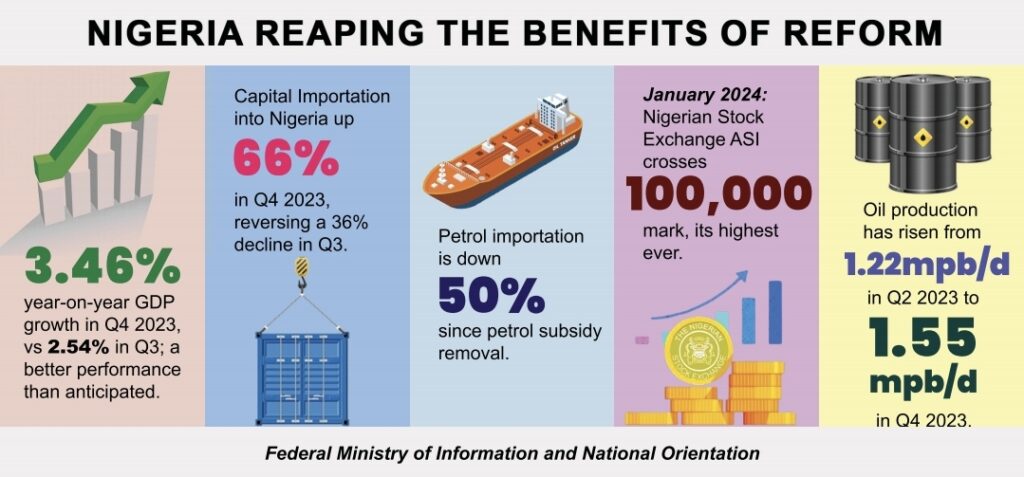
The rising cost of living, worsened by inflation, has inflicted a heightened hardship upon numerous citizens. Prices are persistently on the rise every day, troubling vulnerable individuals residing below the poverty line in rural communities.
The inflation surge has notably impacted the affordability of fundamental necessities such as food, healthcare, transportation, and education, thereby hindering the daily lives of rural inhabitants. Many in these areas attribute the soaring living costs to the recent Subsidy Removal and prevailing inflation trends.
In January 2024, the Nigerian inflation rate surged to 29.9 per cent from 28.9 per cent in December 2023, marking the highest recorded figure to date.
Also, the Nigeria Multidimensional Poverty Index (MPI) 2022 shows that nearly 133 million Nigerians are multidimensionally poor. 7 out of 10 Nigerians living in the rural areas are multidimensionally poor compared to 4 out of 10 in the urban areas. Multidimensional poverty is higher in rural areas, where 72.0% of people are poor, compared to 42.0% of people in urban areas.
The intensity of poverty in rural areas is higher, at 41.9% compared to 36.9% in urban areas. This tells how devastating and hard it will be for a lot of rural dwellers. These figures highlight the difficult challenges threatening rural communities.
Now coupled with the burden of a rising cost of living, hardship looms even larger for these areas.
To understand the experiences of individuals staying in remote areas, far from urban centres, and ascertain how they are coping with these circumstances particularly the vulnerable people including low-income earners, and the unemployed, as they struggle to sustain themselves and their families amidst rising expenses despite financial problems, WikkiTimes paid a visit to a rural settlement. The objective was to gain insights into the experiences of individuals staying in these areas and ascertain how they are coping with these circumstances.
Gwari is a settlement surrounded by rocks, six kilometres from Shuwarin Main Road in Dutse Jigawa State. Formerly accessible with a fee of 1000 naira for to-and-fro, the rising cost of living has also affected the livelihood of the people in this locality.
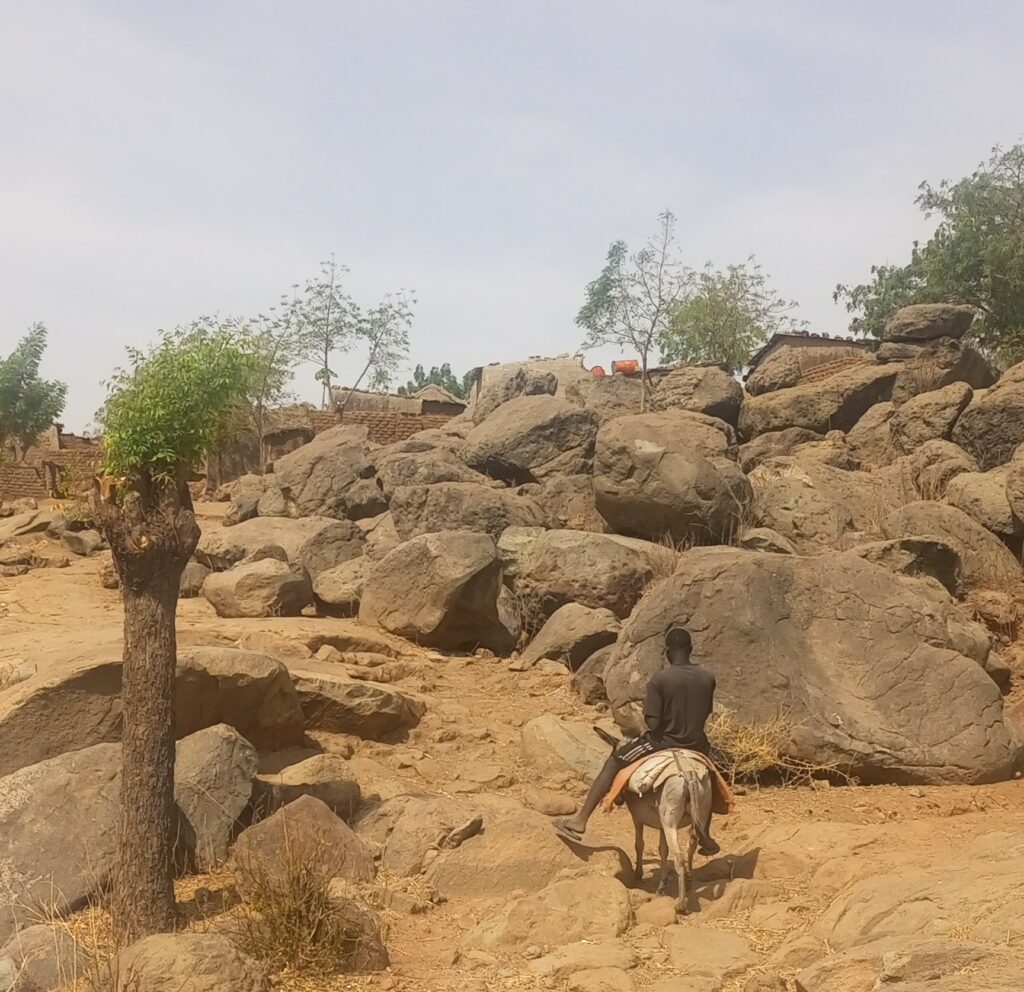
Mal Sale Ismaila Gwari is a resident of Gwari who lamented the current hardship in the country.
“Things are hard, especially food items like Millet, Sorghum, Rice, Maize and Garri that are becoming too expensive to purchase. We mostly travel on foot, use Donkeys or borrow money for transports to go into town to look for menial jobs to do and feed our families. Now things have changed, and our families have to be patient with whatever we can afford at the moment. We can hardly afford three square meals now.” He said.
Mal Ibrahim Musa Gwari is an Okirika vendor ( sells secondhand clothes) who stays in Gwari. He travels around to sell his clothes around Shuwarin Market, Kiyawa to Bauchi state but he is home today because a lot of people would rather buy food items than clothing.
“I couldn’t go to the market today because I can’t afford transport and a lot of people will rather buy foodstuffs than buy clothes as things are hard.”
Also, Mal Yau a trader in Gwari complains about the change and high cost of things. Customers no longer patronize him like before and most of them buy on credit which also affects his profits.
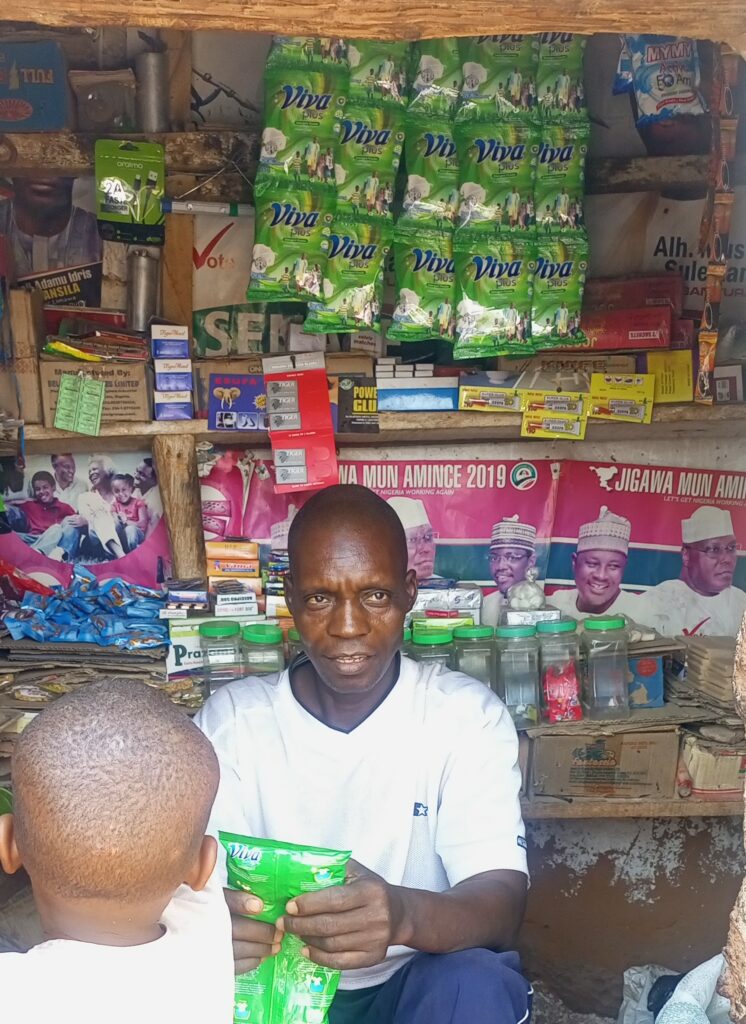
Gone are the days of convenient transportation arrangements. Presently, residents travel the rugged paths either on foot or rely on donkeys to reach the town or market. Now necessity directs their means of travel, most times money are rather used for essential sustenance, leaving little room for transportation.
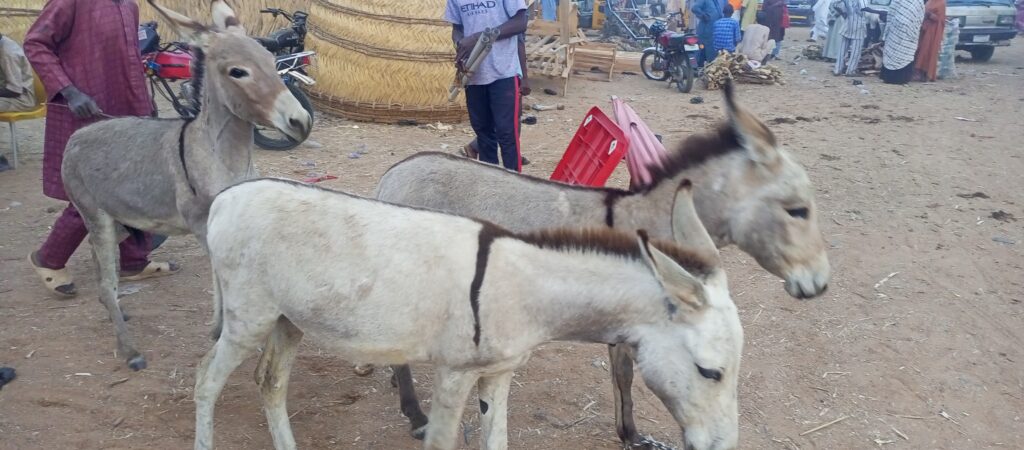
Many residents face vulnerability due to the increasing cost of living, forcing them to prioritize survival above other essential needs such as education, healthcare, and transportation.
Mrs Jamila a traditional cap weaver and a housewife laments the total change of things.
“For 8 years now there has been an increasing cost of living that has affected even a pregnant woman and her unborn child. Our husband has never been a stay-at-home father because his work as a Driver keeps him busy. You could tell his job is doing well from how he takes care of his family. We were well taken care of then; we lacked nothing Food, clothing, health care, laundry and other things.
“Now due to the current state of the country, he goes out only twice a week, if he goes out these days, he just burns out fuel and comes back with nothing for us. Going out yesterday he had to borrow money to come back home. In the past, every week he spent 30,000 naira to feed 18 members of the family.
“Daily he spent 4000 naira on feeding but now he gives 3500 instead. Now we travel on foot from here to Shuwarin or Dutse General Hospital, especially on days the car is parked due to fuel. We don’t frequent the hospital like before we locally take care of mild illness at home and only go there on very serious cases like anti-natal and other illnesses.”
Baba Rakiya who is more than 85 years old said she has never witnessed a hardship like this in the past. “I produced groundnut oil before but the hardship made it hard to produce for sale so I stopped and started selling Maggi instead. Even items like Maggi, Salt and potash have been affected by the high cost of things.”
Binta Sa’adu while crying said the hardship had become unbearable.
“We, our children and grandchildren have no alternative to this hardship. My husband has been sick and so can’t provide for the family, my first son who was murdered last year is no longer here to provide for us. Things have been hard coupled with the current hike in food prices. We hardly have a three square meal these days also no support from the government to help curtail this menace. We are full of debt and have no idea how that will be paid, with six children to feed and a sick husband to take care of it’s really a hard time for us.” She narrates wiping off her tears.”
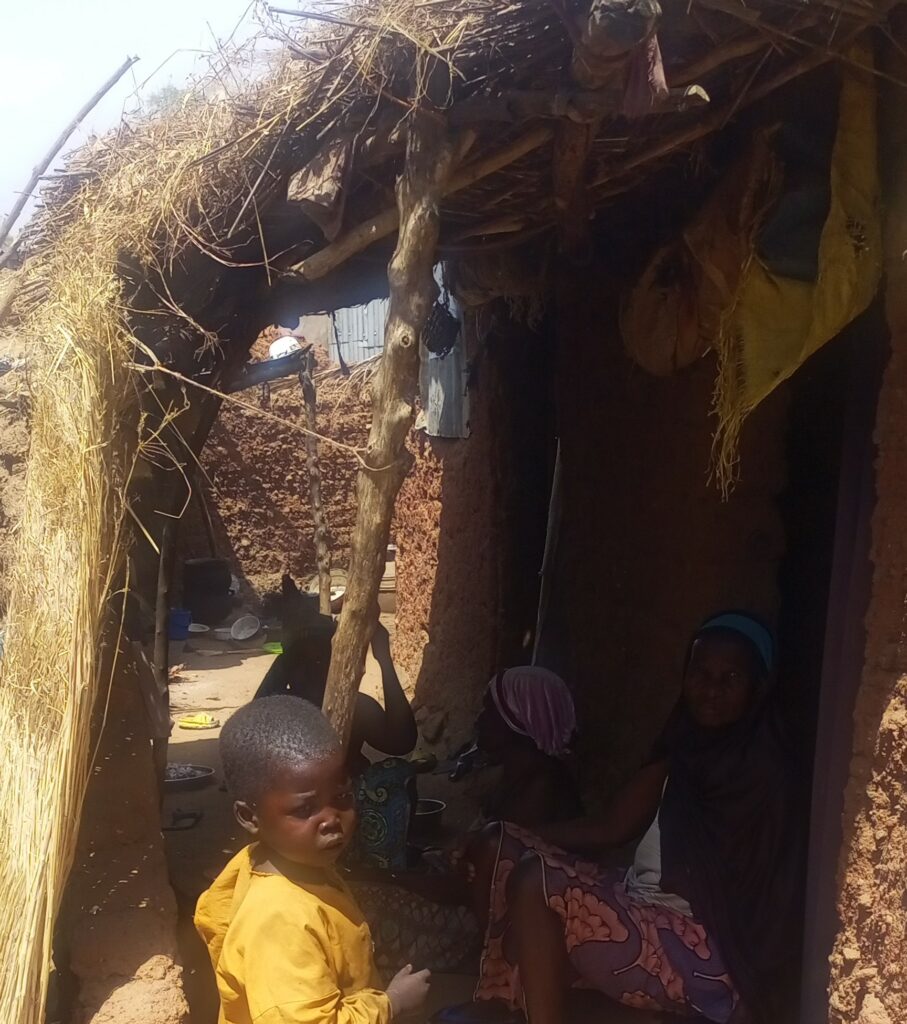
The high cost of living didn’t just affect the people of Gwari but also Shuwarin a popular market about 8 to 9 kilo metres from Gwari village was affected by the current rise in the cost of living and doing business.
Every Monday Shuwarin Market becomes a busy centre as people flock in from both within and outside the state to engage in buying and selling activities. Shuwarin Market is situated in Kiyawa along the Kano – Maiduguri highway, the market attracts traders from nearby states like Bauchi, Yobe, Borno, Kano etc. The market is always full of buyers and sellers trooping in thousands, so much so that moving through the crowds often requires squeezing in between tightly packed individuals.
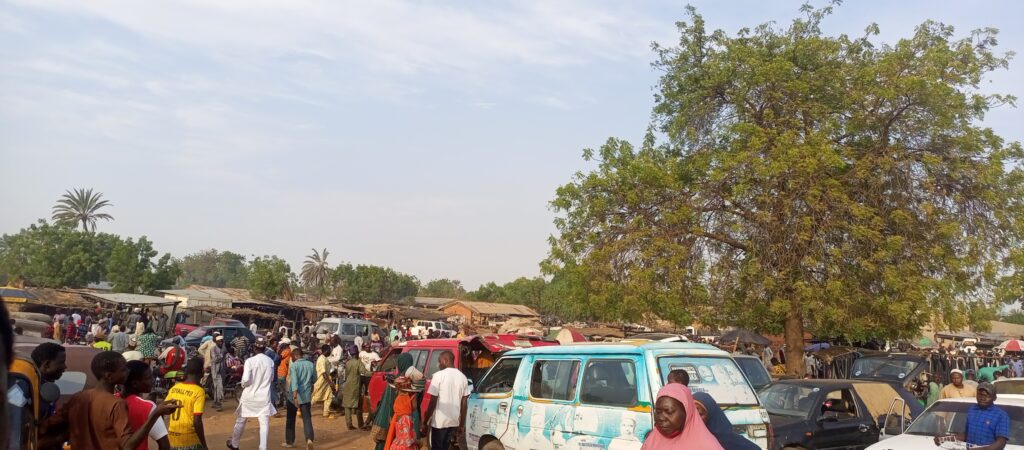
It was a different case on Monday 26th of February; the situation differed significantly, as the market was sparsely populated with only a handful of individuals compared to previous market days. This can be nothing far from the high costs of food and transportation. Additionally, some traders and customers voiced their concerns about the situation.
Mal Ibrahim Shuaibu Harba from Kiyawa local govt is a grain vendor who sells sorghum, millet, beans and hibiscus seeds. He laments the escalating prices of goods and how that has affected his livelihood.
“Today we sold sorghum at 1300 naira, millet at 1300-1350 naira, and maize at 1400 naira. Last week, maize was sold at 1500 naira although the price today has depreciated to 1400 naira due to few buyers.
“Truth is a lot of people no longer come to the market like before for example if 10% is the actual number of people that come to the market to make purchase, now only 7-8% comes into the market to purchase goods.
“Some people prefer sending others to include their items in their purchase because everything is now expensive, transport fare is now expensive. I just went to buy rice and I was told rice is now 3000 naira, I just had to buy it like that.” He said
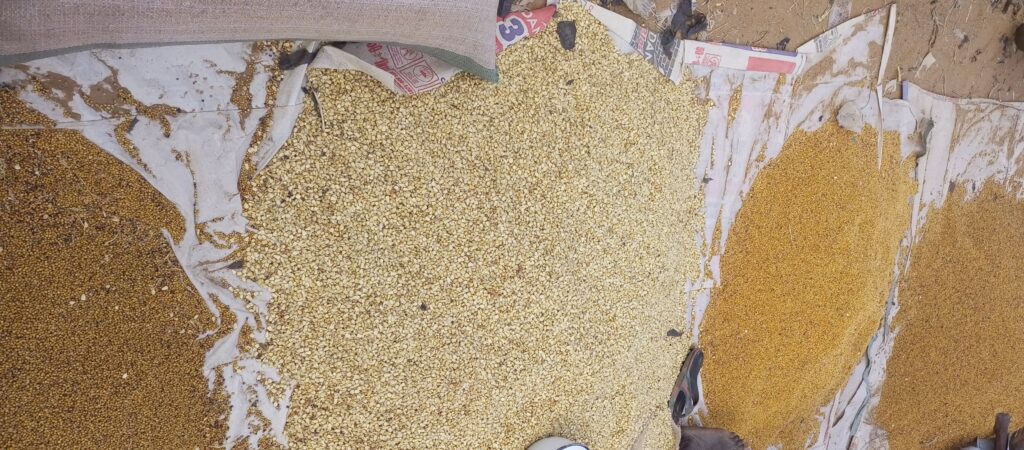
Also, Mal Ibrahim complained about how the price of transporting goods to the market has also contributed to the current price hike in commodities.
“The price of transporting this maize from Rano before was 700 naira but now to transport it is 2000 naira. This sorghum was transported from Tudun Wadan Dankade at 1900 naira; it was around 700-800 naira before.
“Everything has changed; both buyers and sellers will have to be patient with one another as things are hard. In the past, you made lots of profit from selling your goods but now it’s even harder to recover your capital.
“This has affected my livelihood, we all know this is because of the fuel subsidy removal, in the past fuel was sold at 200-250 naira, and it’s now 700 Naira. Places you fare to with 200 Naira are now 400 Naira, so why won’t transportation fares increase, why won’t food prices increase? We the poor masses are always at the receiving end of this.”
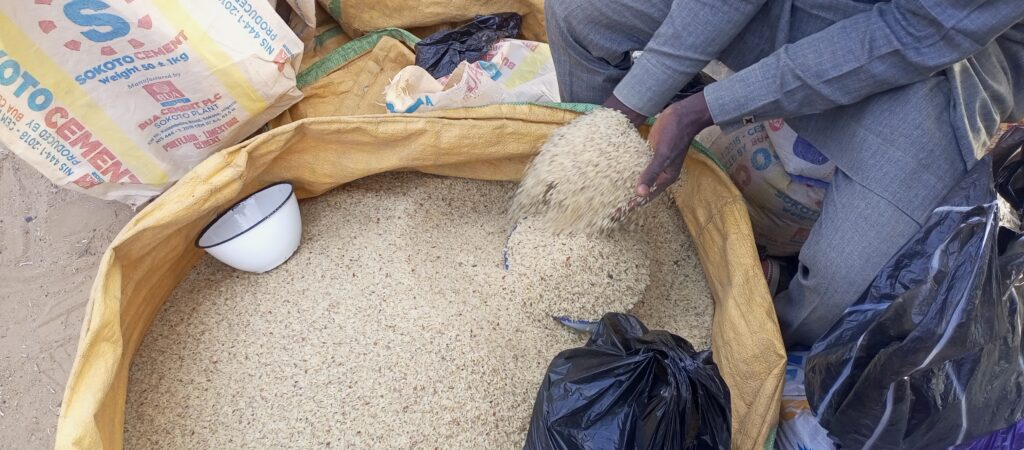
Mal Yusufa Abdulmuminu Harba a grain vendor in Shuwarin market also lamented the financial strain of things and how a lot of customers can’t afford high prices of goods. Some customers who made bulk purchases in the past now take on credit.
“The prices have been going up and down for a while now, sorghum that was at 750 -850 naira is now 1500 and buyers have no money to buy. Customers who formerly bought one or two sacks now can’t afford it; they now reduce their purchase to 10, 12, or even just 3 tiers instead. Just now I had to give a customer 1 tier and a half on credit because he has no money to buy as usual. Things have changed, even the market has changed, look at how scanty it is compared to the past.
“This issue has also affected my family. In my house, we cook 2 tiers and a half but now it’s 1 tier and a half due to the high price of things. In the past 10 cars from Portaskum unload goods here and it finishes before the market closes but now a car is hardly filled. We paid 1500 to get our goods here before but now you pay 3000 for just a sack from Portaskum to Shuwarin market.” He said
Additionally, he appeals to the government to intervene in alleviating the hardships endured by the masses.
“We are pleading with the government to please come to our rescue; the poor masses are really feeling the strain of things. We are suffering. They shouldn’t forget that we voted for them to help us change things for the better. The government should please help us feel better.
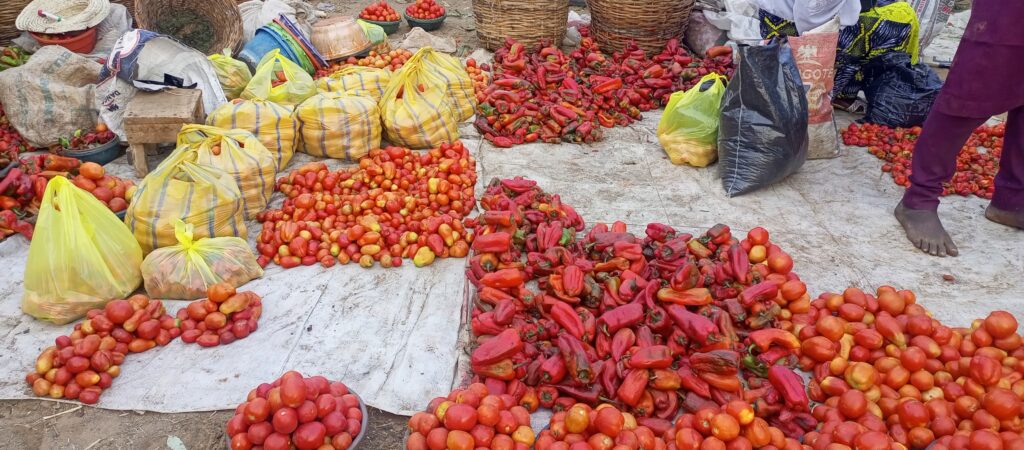
Aminu Nasara Warwade Dam a farmer and a vegetable vendor at Shuwarin market expresses his sorrow over the plight of farmers, who invest substantial resources in cultivating their produce but often reap minimal or no profits in return.
“What is happening is that farmers don’t enjoy the situation and so also sellers. From two months ago fresh food and vegetables were sold at 7000-8000 for a basket but just a few days to date with the increase in fuel, fertilizer and the cost of living now tomatoes are sold at 20,000 naira per Basket.
“Two months ago Urea Fertilizer was 20,000 naira but it’s now 40,000 naira, NPK was 20,000-25,000 naira but it’s now 40,000 naira. So you see farmers have no choice but to increase the prices of these items. Fuel was bought at 700-800 naira, it’s now 1000 naira for a litre and 4000 naira for a gallon.
“The market is no longer full as in the past, due to the high cost of transportation. To come to the market 300 naira is used for transport fares but now it is 700-800 naira. Places we pay 1000 is now 2500, 500 naira is now 1000 naira. Sometimes we come to the market and go back home empty-handed with nothing for the family due to the hardship. The capital that helps keep things afloat also depreciates by the day.”
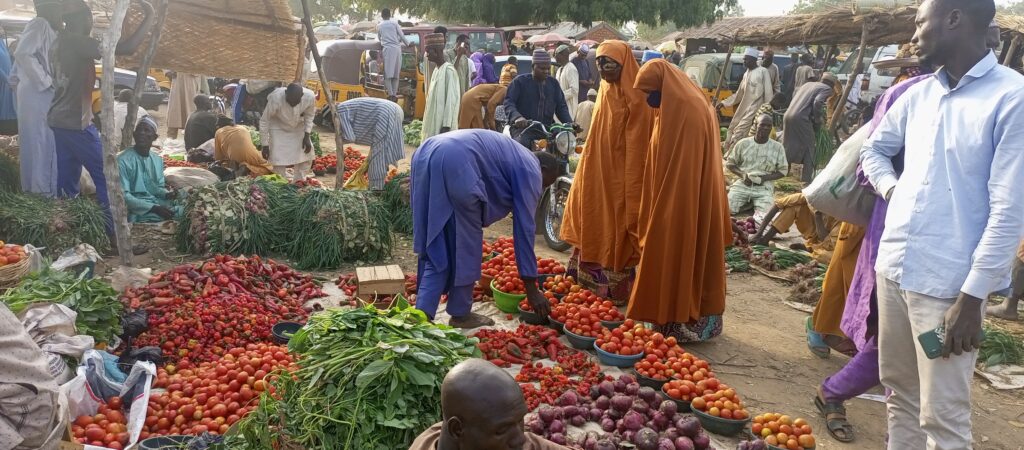
Buyers also lament the high cost of things and how that has affected their livelihood.
Aisha is a frequent buyer of essential food products, she complained about the high prices of goods.
“We just have to buy these items because we need them as the price is above normal, although we are lucky transport fare hasn’t changed in our locality Wurma, we pay 200 naira and that hasn’t changed.”
Barmani Samuel a restaurant owner who also buys her goods from Shuwarin Market also complains about the prices of things.
“I come into the market with 20,000 naira to buy all I want in the past but now 100,000- 150, 000 naira doesn’t buy me all I want to purchase. Customers who patronize me were more than 150 in the past but now I only get 10 to 15 customers if I’m lucky. This is due to the high cost of living; people complain that the food is too expensive they can’t afford it. If we try to reduce prices to help call in customers we end up with no profit.
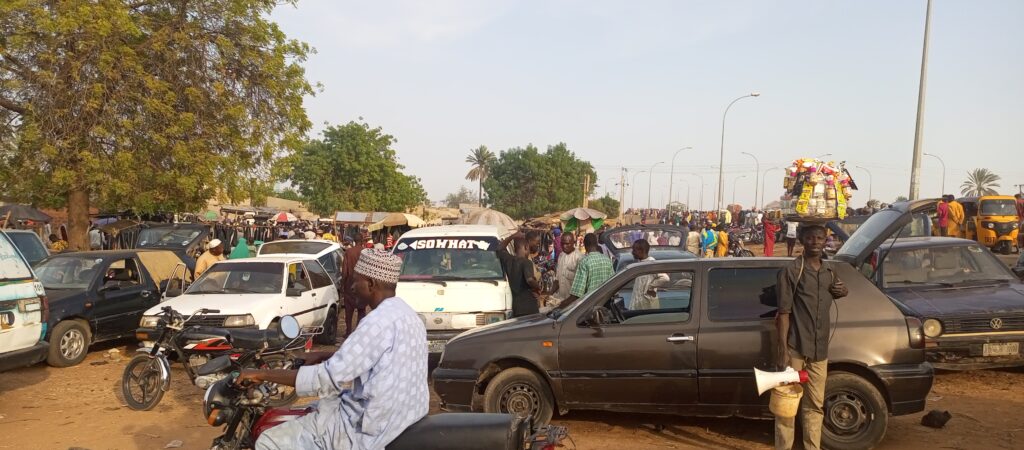
“Even transport has increased from Shuwarin to Dutse now it is 400 naira to and fro. In the past, it was 200 to and fro. Going to Wudil market now is 700 naira before it was 300 naira. Things are really hard now.” She said.
The high cost of transportation has put a restriction on people’s movement. Nowadays People only travel when it’s necessary, as the surging price of fuel has directly impacted transportation costs. The removal of fuel Subsidy has placed more burdens on the masses and relief is nowhere close.
Mal Mustapha Sunusi Baranda is a canter driver. These days it’s hard for him to earn enough to find for himself and his family as passengers rarely move around due to hard times.
“I usually come here before on a fuel of 3000 Naira and still have some spare to care for my family, but the issue now is that 10,000 naira fuel might not be enough to take me to and fro, and times are so hard, we will come and the passengers we are hoping to get to carter for our daily needs are not available. Sometimes we have no choice but to go back home empty-handed.
“In the past, I only needed engine oil and the budget wasn’t above 6000 naira but now the engine oil is 15,000. Treatment oil I normally buy for 200 naira is now 3000 naira; these are the issues we are facing.
“The transport before was 150 naira, it’s now 300 naira. The high cost of living makes it hard for people to move around frequently, they rather outsource.
“I usually go to and fro three times in the past, but now if I come in the morning I won’t get passengers to leave till 12:30 pm and if I come here I won’t leave till around 6:00 –7:00 pm that is magharib or after.” He said
Mal Salihu Baranda, the driver of a Golf Wagon, regularly commutes from Shuwarin market to Baranda, particularly on market days. He attributes the prevailing hardships to removing fuel subsidies and the outrageous prices of car spare parts.
“The issues we are facing are due to the increments in fuel and car spare parts, we have to increase the number of passengers from 6 to 10 people, to regulate transport prices.
“Before I transport people to and fro three times in a day, it’s now twice per day; you see there is a fallback in our previous routine, which is due to less movement of people as it usually was.
“There is a little increment in the transport fare before now it was 300 naira now it’s 400 naira. Even though fuel and spare parts prices are three times more, these are the issues we are facing in our daily reality.” He said.
Nigeria is struggling with multifaceted poverty alongside soaring living costs and inflation. To tackle this hardship effectively, the government must implement multiple approaches to address the situation before it gets further out of control.





